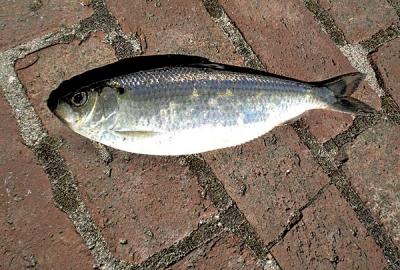A Is for Alewife, H Is for Hawk

Consider the following as an open letter to Larry Penny, The Star’s longtime nature columnist, my good friend, and an indispensable member of the East End community.
Larry, I’m writing this to encourage you to read “H Is for Hawk,” a memoir by Helen Macdonald. Just came out. It’s a beautifully written meditation on one person’s relationship to the wild, and what “wild” means in our time.
I strongly suspect this is your favorite time of year because spring is when, announced by those harbinger peepers, we are joined once again by the wild. This is when your alewives, those anadromous shads, worry their way back up the dreens whose beckoning flavors were imprinted on them eons ago.
It’s a lineage of survival that goes virtually unappreciated in an age when Nature’s comings and goings are too often viewed as curiosities. “What’s that sound?” “Look up, why are those fish swimming into the stream?” “What’s that whistling?” “Why is that bird just staying in one place in the sky?” Or they are not viewed at all.
The peepers’ mating chorus, the alwives’ spawning, the rafts of scoters’ call to gather and choose the next generation, the osprey with her eye on a school to pick the moment to dive and bring one of the fish back to the nest to feed the fledglings.
Harvey Bennett calls this week “Ely Week,” Bonac for Alewife Week, when this area’s still-abundant shad show up at Little Reed and Stepping Stones Ponds in Montauk. They are in North Sea now. Thank you, Larry, for your tireless efforts to clear our dreens and other tributaries of broken conduit, trash, and ill-conceived roadwork so the alewives can fulfill their mission.
The trout season opened on the first of the month, although trout fishermen must drive UpIsland to places like the Nissequogue River, or closer to Southampton, where access requires a fishing guide for out-of-towners. Large and smallmouth black bass may be caught and released now, but are off limits to keep until next month. Other freshwater species like walleye and pickerel are fair game. The fishing has been described as very good in Big Fresh Pond in Southampton and in Fort Pond in Montauk. I reckon you’d find good fishing Hidden Pond in Hither Woods as well.
Angling prognosticators suspect a good shark fishing season due to the cold winter. Mackerel, high on the mako shark menu, tend to stick around in late spring and early summer. Sharkers should remember that Gov. Andrew M. Cuomo signed a bill into law last year that outlaws all but non-stainless steel circle hooks for shark fishing. All shark tournaments must now play by this ruling.
Circle hooks, developed by Japanese commercial longline fishermen, prevent the gut-hooking of fish. Because of its shape, the hook lodges in the jaw of the fish making it easier to dislodge it and improving the fish’s chance of survival when released. The non-stainless steel requirement is meant to allow the eventual disintegration of hooks when dislodging them is difficult or very dangerous. The catch and release of big, toothy sharks can be a challenge. Thanks to State Assemblyman Fred W. Thiele Jr. for his sponsorship of the non-stainless circle hook law.
Guaranteed, the striped bass that over-wintered here are climbing out of their winter torpor and are beginning to look around for food. The south end of Lake Montauk is a good place to take a peek in a week or two. The striped bass season opened today and will run until Dec. 15. The bag limit is one per day measuring at least 28 inches tail to snout.
Fluke, or summer flounder, are winding their way shoreward and should be here by the 17th, the season opener. This year, anglers are permitted five fluke with a minimum size of 18 inches.
The first half of the porgie (scup) season opens on May 1 with a 30-fish bag and a 10-inch minimum. Anglers fishing from licensed charter and party boats get a bonus bag of 45 porgies through September and October.
Fishing is one popular way to appreciate Nature and her creatures, but only one way.
Larry, you have spent your life educating folks about the wild. As Helen Macdonald makes poetically clear in her book, humans have an innate need to keep the wild close — perhaps not as close as hunting rabbits and pheasants with a goshawk, one of the wildest of feathered raptors — but within a knowing reach on walks with people who know, with binoculars, with bird books, by way of your guiding column, Larry. If we become unconscious of their spirits, we will lose our own, and when we lose that, we lose our lives.
As John Muir put it: “Earth hath no sorrows that Earth cannot heal” and “Nature in her green tranquil woods heals and soothes all afflictions.” Believe it. We will first see there are no green tranquil woods to heal us in the inhuman behavior of humans.
